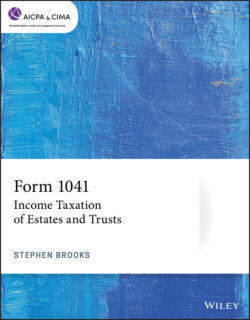Читать книгу Form 1041 - Stephen Brooks - Страница 34
На сайте Литреса книга снята с продажи.
The trust agreement
ОглавлениеIn most cases, the terms of the trust are governed by a written trust agreement. To reiterate, oral trusts are also recognized in some situations; however, in most states that have adopted the Uniform Trust Act, an oral trust is only recognized if there is clear and convincing evidence a trust was created.44 The specific terms under which the trustee deals with the investment of the trust corpus and distribution or retention of the trust income and principal to the trust beneficiaries is generally stated in the trust agreement. The trust can either be established during the lifetime of the settlor of the trust (an inter vivos trust) or under the settlor's will (a testamentary trust).
A typical trust agreement will contain the following seven trust provisions:
The declaration of trust — This is the provision that meets the requirement that the trust settlor manifests the intention to create a trust. For example:Settlor hereby delivers to trustee the assets listed in Schedule A, to be held, invested, and distributed pursuant to the terms of this trust agreement, together with any other property that may be added hereto.
A statement of trust purpose — Sometimes this provision will be omitted, but if it is included in the trust agreement, it will provide valuable guidance to the trustee and the courts as to the settlor's intent as to how the trust should be administrated. For example:It is the settlor's intent in establishing this trust to care for the maintenance and support of his wife before all others, and the trust shall be administered for that purpose.
A statement of revocability or irrevocability — Under the UTC, a trust is revocable unless it states that it is irrevocable. However, the trust agreement should include either of the following provisions to make the intention clear:This trust shall be irrevocable and the settlor hereafter shall have no right to alter, amend, or revoke this trust in any manner whatsoever.Alternatively:This trust shall be revocable and the settlor specifically reserves the right to alter, amend, or revoke this trust at any time.
Dispositive provisions — The dispositive provisions provide how income and principal are to be held and distributed during the term of the trust, and also how and to whom the balance of the trust assets are to be distributed upon the termination of the trust. Here is some illustrative language:During the lifetime of the settlor's wife, the trustee shall pay and distribute to her or for her benefit the entire net income of this trust, of which payments shall be made to her no less frequently than quarterly. In addition, the trustee shall from time to time pay to the settlor's wife, or shall apply directly for her benefit, as much of the principal of this trust as the trustee, in its absolute discretion, may consider desirable for her health, maintenance, and support.Upon the death of the settlor's wife, the remaining balance of the trust shall be distributed outright and free of trust to the settlor's then living issue, in equal shares.
Administrative provisions — The administrative provisions will generally grant powers of administration to the trustees which are in addition to those provided under the governing law. The intention of adding these provisions is to generally facilitate the administration of the trust without unnecessary court involvement.Administrative powers:In addition to the powers conferred on the trustee under 20 Pa. C.S. Section 7780.5, which shall include all of the illustrative powers provided in 20 Pa. C.S. Section 7780.6, the trustee shall have the following powers until all property is distributed:To retain any real or personal property (including stock of any corporate trustee or of a company controlling it) in the form in which it is receivedTo hold property unregistered or in the name of a nomineeTo buy real and personal property from the personal representatives of the settlor's estate, and to lend money to them upon such terms and conditions as the trustee deems advisable, even if the settlor's personal representative is also a trustee of this trust
Trustee provisions — The trustee provisions normally name successor trustees, and also may deal with such matters as procedures for removal of trustees, and how they are to be compensated.Upon the death of the settlor, the settlor's wife, by signifying her acceptance in writing, shall become a trustee hereunder. Any successor trustees shall have all the powers conferred upon the originally named trustees except those powers expressly limited to the disinterested trustee.
Governing and situs — This provision will establish the situs of the trust, and the law which shall govern the administration of the trust:The situs of this trust shall be the Commonwealth of Pennsylvania. Questions pertaining to the validity, construction, and administration of the trusts created under this instrument shall be determined in accordance with the laws of the Commonwealth of Pennsylvania.
